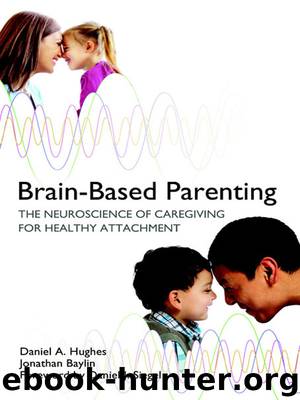Brain-Based Parenting by Daniel A. Hughes

Author:Daniel A. Hughes
Language: eng
Format: epub
Publisher: W. W. Norton & Company
Published: 2012-05-06T16:00:00+00:00
How Curiosity Works in Therapy
When parents who are experiencing blocked care seek therapy for their difficulties with their children, they most often have difficulty separating their judgment about their children’s behavior from efforts to understand this behavior. They are not in a mind-set wherein they can safely explore the possible meanings of their children’s behavior; they just want it to change. At this point, the behavior is most likely experienced as wrong or inappropriate and the reasons for the behavior are either considered irrelevant or they are assumed to reflect “bad” motives, wishes, thoughts, or feelings.
If the therapist tries to stress the value in understanding what the reasons might be, parents experiencing blocked care might assume that the therapist is seeking excuses for their children’s behavior. If the therapist tries to understand the reasons for the parents’ behaviors, parents might experience this focus as an effort to uncover something wrong with what they are doing and so blame them. When parents are stuck in a blocked care mode, their goal is often to ensure that the therapist agrees with them that their children’s behavior is wrong and then to advise them regarding what they might do (specialized discipline) to correct the behavior. Anything else is likely to be experienced as being unsupportive.
If the therapist has been able to convey to the parents that their inner lives are completely accepted and that the therapist has a sense of urgency to simply understand—not evaluate—many parents may begin trying to understand as well. The therapist’s reflective stance evokes the parents’ reflection on their inner lives, their children’s inner lives, and the meaning of the behavioral events that are occurring. Stepping back to look at themselves and their children with curiosity, they may well begin to experience a return of the caregiving behaviors that had become blocked.
Example: Ann has been experiencing blocked care in relationship to her 16-year-old son who has been increasingly noncommunicative with her over the past 2 years. When he does talk with her, it is mainly to ask her to do something for him or to criticize her parenting. She sought treatment for this problem with her son from the therapist, Bill.
Mom: I just want basic politeness! Is that asking too much? If I ask him a simple question, it seems that I deserve—anyone would deserve—an answer. And I get nothing except maybe he sighs and walks out of the room.
Therapist: That does seem like such a small request that you are making … and yet he doesn’t give you a simple answer. Any sense of what that might be about?
Mom: What difference does it make? Are you looking for something that would justify what he is doing?
Therapist: Ann, I’m sorry if I implied to you that his behavior is OK and I want to justify it.
Mom: That’s what it sounds like.
Therapist: Then I need to be clearer. I’m not searching for an excuse for his refusing to answer a simple question, just what the reason might be.
Mom: What’s the
Download
This site does not store any files on its server. We only index and link to content provided by other sites. Please contact the content providers to delete copyright contents if any and email us, we'll remove relevant links or contents immediately.
Periodization Training for Sports by Tudor Bompa(8246)
Why We Sleep: Unlocking the Power of Sleep and Dreams by Matthew Walker(6689)
Paper Towns by Green John(5173)
The Immortal Life of Henrietta Lacks by Rebecca Skloot(4570)
The Sports Rules Book by Human Kinetics(4376)
Dynamic Alignment Through Imagery by Eric Franklin(4204)
ACSM's Complete Guide to Fitness & Health by ACSM(4046)
Kaplan MCAT Organic Chemistry Review: Created for MCAT 2015 (Kaplan Test Prep) by Kaplan(3997)
Introduction to Kinesiology by Shirl J. Hoffman(3759)
Livewired by David Eagleman(3757)
The Death of the Heart by Elizabeth Bowen(3599)
The River of Consciousness by Oliver Sacks(3590)
Alchemy and Alchemists by C. J. S. Thompson(3506)
Bad Pharma by Ben Goldacre(3416)
Descartes' Error by Antonio Damasio(3264)
The Emperor of All Maladies: A Biography of Cancer by Siddhartha Mukherjee(3137)
The Gene: An Intimate History by Siddhartha Mukherjee(3087)
The Fate of Rome: Climate, Disease, and the End of an Empire (The Princeton History of the Ancient World) by Kyle Harper(3053)
Kaplan MCAT Behavioral Sciences Review: Created for MCAT 2015 (Kaplan Test Prep) by Kaplan(2978)
